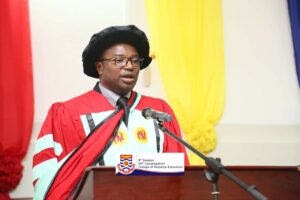Prof Nyarko-Sampson makes far-reaching recommendations for GNAT reforms

Professor Eric Nyarko-Sampson, Vice-Chancellor of the University of Environment and Sustainable Development (UESD), Somanya, has made recommendations for the strengthening of the Ghana National Association of Teachers (GNAT) to pursue its mandate.
The Association has prospects for an expanded membership and improving their welfare, he said and added that as long as teacher training institutions continued to train teachers, GNAT was an option they may think about to join.
Professor Nyarko-Sampson was speaking during the Sixth Quadrennial Eastern Regional delegates’ conference of GNAT, which was on the theme: GNAT@90 surviving as a reliable and vibrant teacher union in the 21st century – teaching the journey, explicating the essence and examining the prospects.
He praised GNAT leadership for creating investment opportunities, organising pieces of training and negotiating for increases in salaries and better conditions of services for their members, but said they should not ignore the basic needs of teachers.
“I wish to implore upon the hierarchy of GNAT not to be so much high-looking, lest it forgets the minute needs of the teacher,” he said. “Investment is good, but it’s important to take the necessary precautions.”
He, therefore, recommended that leaders of GNAT should conduct a SWOT [Strengths, Weaknesses, Opportunities and Threats] analysis of the needs of members to ensure its internal strengths and weaknesses were frequently addressed.
He also called for improvements in the Association’s communication structures and that timeous and recognised channels should be provided to allow free flow of information between leadership and members.
This would remove rumour-mongering and improve ‘we-feeling’ as well as keep leaders on track to discharge their primary responsibilities and also win the total support of the members for the growth of GNAT.
The union should further strengthen its basic units in schools and zones by providing logistics such as motorbikes to local executives or representatives to enhance their motilities for supervision and monitoring duties.
It should also ensure coordinated continuous professional development programmes such as seminars, workshops, conferences, public lectures and symposia were organised for teachers.
Professor Nyarko-Sampson, who is the first VC for UESD, noted that this was particularly important in the face of professionalization of teaching in Ghana, where teachers needed specific Continuing Professional Development (CPD) points to renew their licences.
He advised GNAT to apply to the National Teaching Council for accreditation as a CPD service provider, so that it could organise professional development programmes for its members at a reduced cost.
He also proposed that the union should organise mass training covering topics like emotional intelligence, career progression, preparing for retirement and life after retirement for members right from their initial stages of joining the profession till their retirement.
“In this case the payments related to health would be reduced significantly, whilst mental health of members would improve,” he added.
National President of GNAT, Ms Philippa Larsen, expressed worry about the disparity in salaries in the public sector and called on President Nana Addo Dankwa Akufo-Addo to initiate a process towards establishing a commission made up of inter-disciplinary experts.
The proposed commission would help to advise the government on salaries for all public jobholders to guarantee fairness.
“After all we all go to the same market and there should be fairness in the salaries of all public sector workers,” she said.
She also urged the Ghana Education Service (GES) to continue to work on all outstanding issues of teachers such as promotions for industrial peace and harmony, saying, “There are many unresolved issues and we call on the GES to factor in the concerns of teachers.”
She said GNAT was displeased with the recent upward adjustment of salaries for public sector workers that was pegged at four and seven per cent for 2021 and 2022 respectively.
“That is not what we expected. “I am sad, all leaders are so sad and that is why we didn’t have the courage to disclose the initial outcome of the negotiations to you,” she said.
“And we are not going to agree. We will not agree to that.”
Mrs Margaret Nsiah-Asamoah, Eastern Regional Director of GES, who spoke as a member of GNAT, was hopeful that the Association would stay in the cause of its collective quest to look out for the welfare of the Ghanaian teacher.
“Indeed, the reward of the Ghanaian teacher is no longer only in heaven, but also here on earth,” she added.
The Director who also made several observations about GNAT and cautioned against political infiltration in their ranks, advised its leaders to always consult and engage broadly before commenting on important national issues.
She noted that that as leaders their views and opinions were taken as those representing the Association, and they should therefore be circumspect in their public comments.
“I have also observed that members of teacher unions are also increasingly becoming dissatisfied and discontent with various decisions taken by their leaders,” she added.
Mrs Nsiah-Asamoah called for introspection into GNAT antecedents and learn from it, stating; “We all know how the infiltration of political interests and partisanship have broken our ranks from the very beginning before independence.
“I, therefore, think it is about time we looked at not repeating the very mistakes we have made since the 1960s.”
Source: GNA
